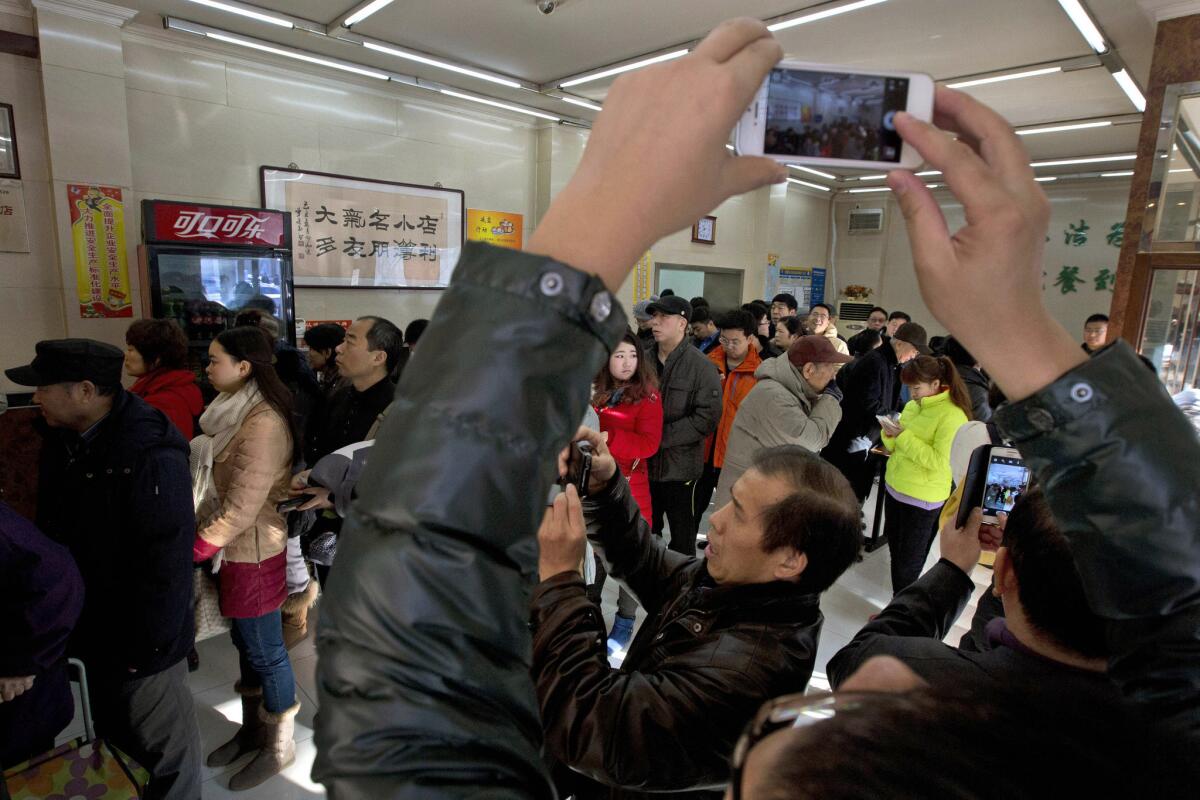China’s President Xi Jinping leads a Communist charm offensive

- Share via
BEIJING — Chinese President Xi Jinping has a new year’s resolution for the Communist Party: Be more charming.
In a nation where senior leaders have long seemed distant and remote, revealing few personal details, interacting minimally with ordinary people and enjoying privileges remote from the masses, Xi seems to be trying to loosen the stylistic straight jacket.
On Saturday, he paid a surprise visit to a Beijing dumpling shop, lining up and paying for his own $3.50 lunch. News of his visit quickly went viral, and his order — six steamed buns, a plate of stewed pig intestines and steamed vegetables — has quickly become known as the “President’s Combo.”
Then, on Tuesday, he delivered his first televised new year’s address, a speech notably more informal than the ones given by his predecessor, Hu Jintao.
Though perhaps still stiff by U.S. political standards — don’t expect China’s president to play the saxophone on a talk show a la Bill Clinton any time soon — Xi’s address was relaxed and friendly.
He sat behind a large desk in his office — apparently the first public glimpse inside the chamber — with family snapshots on the bookshelves behind him. One showed the president riding his bike with his daughter; another pictured him pushing his father in a wheelchair; a third had him kicking a soccer ball. State-run television even released close-up versions of the photos, apparently in response to popular demand.
The public appears to be responding. In a monthly survey by China Youth Daily, respondents ranked Xi’s visit to the dumpling shop as the story they were “most satisfied” with in December — even ahead of the government’s decision to abolish labor camps (#2) and the nation’s successful landing of a rover on the moon (#6).
“It’s brave to express this kind of style; it goes against the traditional ‘official behavior’ that’s expected of politicians. It’s not the traditional mysterious politics,” said Hu Xingdou, professor of economics at the Beijing Institute of Technology.
“But in the end, it’s actions that are the most important. Can the problems be solved? Will the rich-poor gap be narrowed? In past decades, there have been lots of brainwashing-type messages,” but people are watching for results now.
In recent months, Xi has also demonstrated his more common touch by traveling with his wife on overseas trips and referencing popular singers and TV shows in media appearances.
In a speech this week before the Politburo’s Central Committee, Xi told senior leaders that China needs to work on its charm game as it becomes a more powerful country.
China is facing domestic and foreign points of friction. At home, the government is dealing with intense pollution, food safety issues and escalating deadly clashes with minority Muslims, to name but a few issues. Overseas, it faces territorial disputes with neighboring countries.
At home and abroad, Xi’s administration has been taking a more confident — some would say aggressive — posture, cracking down on corruption but also on voices of dissent. Its recent declaration of an air defense identification zone covering most of the East China Sea angered the U.S., South Korea and Japan.
Xi said it’s key that China be portrayed as a “civilized country featuring rich history, ethnic unity and cultural diversity, and as an Oriental power with good government, developed economy, cultural prosperity, national unity and beautiful mountains and rivers,” the official New China News Agency reported.
China, he added, needs to “increase the creativity, appeal and credibility of China’s publicity” and better use new media to boost China’s “soft power.”
Such efforts already appear to be underway. In October, a cartoon explaining how the U.S., Britain and China pick their leaders (and implying that China’s system was superior) went viral.
“Many roads lead to national leadership and each country has one for itself,” the video said, “whether by a single ballot that gets the whole nation out to vote or a meritocratic screening that requires years of hard work like the making of a kung fu master.”
Exactly who made the video was unclear, but many online observers believe there was some official hand involved. Then this week, another slick video promoting the Communist Party appeared in English, touting the catchphrase, “The Communist Party of China is with you along the way.”
China’s 1.3 billion people “all have their own dreams. … Our people’s dreams are our goals. The 80 million CPC members are working for everyone’s dream,” the narrator says.
Li Jie, a vice director of the Chinese Academy of Social Sciences, told the Beijing Youth Daily this week that he took along both videos on a recent tour of Laos and Cambodia, where he met with academics and representatives of think tanks. The videos, he said, were well-received, recalling that one young member of the Cambodian People’s Party called them “fascinating.”
Twitter: @JulieMakLAT
Nicole Liu in The Times’ Beijing bureau contributed to this report.
More to Read
Sign up for Essential California
The most important California stories and recommendations in your inbox every morning.
You may occasionally receive promotional content from the Los Angeles Times.











